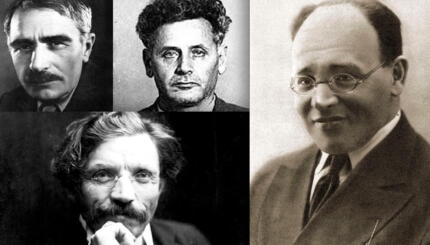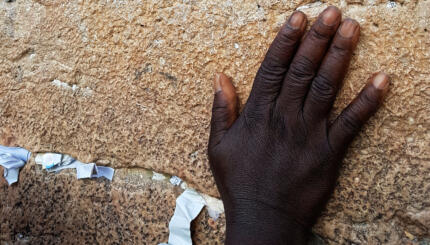In the opening chapter of the 21st century, short fiction–Jewish and otherwise–has lost much of its stature. Conventional wisdom tells us that serious literateurs write novels. Indeed, in 2005, The Atlantic Monthly–for decades one of the premiere platforms for short stories–stopped publishing fiction regularly. Now they stick a few stories into the shtetl of an annual issue.
But short stories were once quite important. When Saul Bellow placed his 1952 translation of "Gimpel the Fool," in The Partisan Review it drastically altered not just the life and career of Isaac Bashevis Singer, but American literary history, as well.
Yet, one might argue, that swimming out of the mainstream has helped to strengthen the genre. As short-story specialist Steve Almond once wrote: "the barrier to market is much higher for story collections [than novels], because they make so little profit. You don’t get a story collection published unless the writing is vivid enough to compel several otherwise rational minds to make what is by most standards (often their standards) an irrational economic decision."
The New Immigrant’s Tale
Some of the most powerful works of recent Jewish short fiction concern immigrant characters who find it strange to be living in the Land of Milk and Honey and Cable TV.

Help us keep Jewish knowledge accessible to millions of people around the world.
Your donation to My Jewish Learning fuels endless journeys of Jewish discovery. With your help, My Jewish Learning can continue to provide nonstop opportunities for learning, connection and growth.
Contemporary immigrant tales return to Jewish fiction the fabled idea of otherness and a sense of displacement. This eternal anxiety of the Jew is something that I.B. Singer’s stories were so good at depicting, something we were reminded of when his Collected Stories appeared in 2004 to mark the great man’s centenary. As critic Mark Zanger once wrote: "His most particular stories, set in New York, are about the increasingly universal problem of exile and survival."
But exile doesn’t just happen in the Big Apple. In Natasha and Other Stories, a 2004 collection by Latvian-born Canadian writer David Bezmozgis, a group of linked tales follow the fortunes of the Bermans, a Jewish immigrant family, in their struggle to establish themselves in the Great White North. The stories–some of which appeared in The New Yorker and Harper’s–employ some of Bezmozgis’ own personal history (he was born in Latvia in 1973 and came to Canada in 1980) but are not to be confused with memoir.
Then there is Lara Vapnyar. In 2003, she published There Are Jews in My House, a book that included the beautiful tale, "Mistress," set in the Kings Highway section of Brooklyn, in which a Russian boy named Misha unwittingly learns the word "mistress" while he happens to observe his grandfather’s interactions with his paramour. The whole story sets a tone of linguistic comedy and subtle heartbreak. When asked by The New Yorker how it felt to write in her second language (Vapnyar emigrated to the United States at 23), she said, "It makes me scared, because I don’t hear my stories. I don’t know how they sound. On the other hand, I am not as sensitive to my imperfections as I would be if I wrote in Russian. I blame them all on the fact that I’ve only recently learned English."
Another two-language author is Naama Goldstein. Born in Boston, Goldstein moved with her parents to Israel when she was three. She’s been back-and-forth ever since. This has left her something of an expert on geographical, if not emotional, displacement. As Caroline Leavitt wrote in her review of Goldstein’s The Place Will Comfort You (2004): "Goldstein writes radiant stories about just what it means to embrace or struggle with your culture. They ask, Can you be as Jewish in an Israeli as you are in suburban America? Or is the American dream of a two-car garage and gated home just a way-station for your true destiny in Israel? Where, indeed, can Jewish people feel most and forever at home, or is the idea of a true Jewish state simply more of an elusive state of mind?"
Going Native
But all-American Jews can write stories that ask similar questions. In 2005, Jay Neugeboren published a collection called News from the New American Diaspora and Other Tales of Exile. And there was Joan Leegant’s "Seekers in the Holy Land," from her collection An Hour in Paradise, a finalist for the National Jewish Book Award. This story shows a character who flees the safety and certainty of Diaspora life. Leegant’s questing American leaves Boston for Safed and asks, "What was there in America if you were Jewish? Temples with health clubs? Fund-raisers? Rabbis…preoccupied with building campaigns, numbers, membership rolls? Or, on the other side, rules, fetishistic rules, a black and white orthodoxy. But for the soul, what was there?" Unfortunately, Leegant’s protagonist learns that this idea of being Jewish has a way of following people, even to Israel.
Perhaps the best expression of the American strain of Jewish alienation comes from Todd Hasak-Lowy’s superb short story, "On the Grounds of the Complex Commemorating the Nazi’s Treatment of the Jews." Says the tale’s protagonist, a mopey, heartbroken Jewish-American businessman paying a visit to Yad Vashem:
"As best he could tell, when one got past the American Jew’s interest in who else in America–from celebrities to closeted coworkers–was Jewish, American Jews’ two main interests seems to be the Holocaust, as he often heard it called, and the State of Israel. He was, of course, with both entities on some superficial level. Right below the threshold of his consciousness, he sensed he should, as he explored his Jewishness, choose either the State of Israel or the Holocaust, as he often heard it called, as his main Jewish interest."


